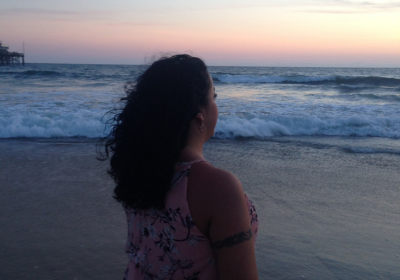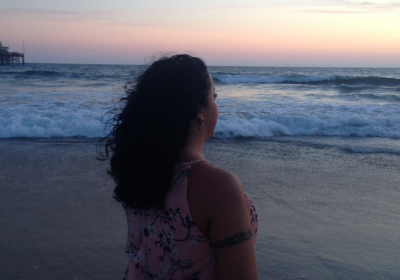Caregiving Through mBC: Where Sorrow and Joy Coexist
By Yoli


The Unplanned Journey of Caregiving
There’s a moment—maybe while folding laundry, driving in your car, or whispering prayers as your loved one sleeps—when the reality of being a caregiver to someone with a metastatic breast cancer (mBC) diagnosis settles in: this isn’t the life you planned. And it will never be what it once was. Not for you. Not for your loved one.
When someone you love is diagnosed with mBC, the world shifts beneath you. What once felt solid—routines, expectations, plans—suddenly becomes uncertain.
As caregivers, we carry so much. We walk into appointments with brave faces, ready to take notes. We memorize schedules, watch for side effects, hold their hands through it all, hold our breath when we see their health care team, and exhale with relief when we hear a bit of good news. We cook meals that often go untouched and try to make sense of a life we never imagined.
Caregiving is love in action. It’s not always grand or graceful—it’s often quiet, behind the scenes, and deeply exhausting. But it’s sacred work.
It’s also praying for hope in the dark hours when fear creeps in—asking for strength, peace, and something to hold onto. And somehow, hope finds a way to show up. In whispered prayers. In steady hands. In the decision to keep going, even when it’s hard.
The Duality of Caregiving
There’s one part of being an mBC caregiver that I did not feel prepared for—the duality of it all. The delicate balance between joy and sorrow. The quiet ache of grief wrapped inside a moment of laughter. And the relief and guilt you feel when you finally make time for yourself. The longing for what once was—not because your loved one is gone, but because cancer has changed so much around them. Conversations that used to be light and easy often include the word “cancer.” The spontaneity of weekend plans gives way to energy crashes and side effects that just won’t let up. Visiting family or watching your child play sports often takes a back seat when your loved one’s nausea or dizziness kicks in. Even simple things—like watching a favorite show together or sharing a meal—can feel different when they are in pain. That spark of ease, that sense of normalcy, becomes harder and harder to find.
And sometimes, it changes them too. The way they move through the world. The way they see themselves. And yet, through it all, you still find glimpses of who they are—their spark, their soul, the essence that reminds you why you fight alongside them.
You don’t always get it right. Some days, the weight is too much. But even through the tension and fatigue, staying connected is possible. You can still see them—and that will pull you back to the heart of why you’re here: because you care deeply, even when it’s hard to show it.
There will be good days. Days when the weight feels lighter, the conversation flows, and you almost forget—for just a moment—that cancer is part of your reality.
And then there will be unbearable days. Days when the side effects hit hard, when nothing you do seems to help, when it feels like frustration and fatigue are winning. Days when you question if you’re doing enough, or if your love is even reaching them.
This rhythm—the ups and downs, the hope and heartbreak, the happiness and guilt—is part of the mBC caregiving experience. There’s no perfect way to show up. But showing up is what matters. Being present, even when it’s messy, is one of the most courageous things you can do.
Letting Joy Lead, Even in Sorrow
Even in the heaviness, even in sorrow, joy can take the lead. Not by erasing the pain, but by walking beside it.
Joy doesn’t have to be loud. Sometimes it’s as small as a shared laugh, peaceful walk, dancing or singing along to your favorite song, a bite of something they actually enjoy eating, a cuddle in bed before the craziness of the day begins, or a spark in their eyes when they feel like themselves again—not just a cancer patient.
These moments aren’t a denial of what’s happening. They’re a declaration: Wherever we exist, joy has a place.
So let joy in. Let it lead. Even if only for a minute. Let it soften the edges of sorrow. Let it remind you that love—true love, in the form of action—knows how to hold space for both.
You don’t have to pretend things aren’t hard. You just have to try to remember they’re not only hard. There is still goodness. Still beauty. Still joy worth holding onto.
So, if you’re walking this road right now—traveling down the mixed and winding road of exhaustion, hopefulness, heartbreak, and fierce love—know that you are not alone. Joy and sorrow may take turns leading, but both can coexist. And in the middle of it all, your presence is a gift. Your love matters. Your care is seen. And even when the storm rages, there is still joy to be found.










